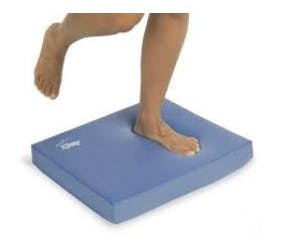
What contributes to my balance?
Balance is essentially made up of three components: your vision, vestibular system, and proprioception. We will break these down further!
Vision and balance:
Vision is one of the major contributors to balance. Looking at your surroundings provides input as to where your body is in relation to the wall, the floor, etc. For example, your brain registers that the wall is vertical in front of you and that keeps your balance in check. If vision is impaired or eliminated it will have significant effects, try to stand on one leg with your eyes closed!
Proprioception and balance:
Proprioception is knowing where your body is in space. Proprioception is accomplished through the joint receptors in your muscles, tendons, and ligaments. For example, this is how you would know if your finger is bent or straight while closing your eyes. If the muscle, ligaments, and tendons are not doing a proper job with this task, then the input to your brain will be decreased and balance will subsequently be decreased. Ways to challenge proprioception are standing on foam or an uneven surface.

Vestibular system and balance:
The vestibular system is housed in the inner ear inside your head. This system provides input to your brain about which way your head is turned and if your head is accelerating or decelerating. If the vestibular system lags behind, it can affect your balance during quick movements of the head. Examples are turning your head when you hear an unexpected noise while walking, or looking up to see an airplane. If the vestibular system is lagging, it can also affect eye movement which crosses over into the “vision and balance” portion of this blog. Lagging of eye movement when quickly moving your head can cause imbalance.
Other things that might affect balance:
One other thing that may affect your balance is medications. If you have had a recent medication change or change in dosage that could likely be causing light-headedness. This can especially happen with medications for high blood pressure.
Orthostatic hypotension is another condition that can cause light-headedness when going from laying down to sitting/standing, or from sitting to standing. During these positional changes, your blood pressure drops then has to rise back up to where it was. If the blood pressure takes too long to return to normal you will feel light-headed. Those high blood pressure medications are one of the things that can cause this process as they decrease the amount of fluid in your blood. The solution to this problem is to stay hydrated and move slowly when getting up!

We can help!
If you are experiencing any or all of these conditions, we can help! Same-day/Next-day Appointments are available. Please visit www.frederickpt.com or call (301) 663-7898 for more information.

